- Serbia
Get to know Serbia
- Citizens
Culture and science
Health services
Pension and disability insurance
- Business
Employment
Economy
- Media
- Government
- Contact
Keep in touch
Contact form
Back
Keepin touch
Whether you have a question, comment, suggestion or any problem in the purview of the government, send us your message and we will try to respond as soon as possible. If your problem is not in our purview, we will forward your message to the relevant institution.
Q:
A:
Japanese government sets aside €9 million for Serbia's health sector
Belgrade,
8 April 2004
An official ceremony was held today at the Serbian Clinical Centre's Institute of Digestive System Diseases, marking the completion of a project of supplying leading medical centres in Serbia with equipment. The Japanese government funded the implementation of the project with around €9 million in non-repayable aid in the period between 2001 and 2004. Of this sum, €2.7 million was allocated to the Serbian Clinical Centre, which purchased 300 pieces of state-of-the art medical equipment.
As part of this project, the clinical centres in Novi Sad, Nis and Kragujevac also obtained new medical equipment.
Speaking at the ceremony, Japanese Ambassador to Serbia-Montenegro Ryuichi Tanabe voiced satisfaction with the fact that this equipment will contribute that all Serbian citizens have better medical treatment. He voiced hope that the Japanese aid will significantly improve the level of health care in Serbia, and contribute to strengthening of friendly ties between the two countries. He added that the Japanese government has so far set aside $68.5 million as economic aid to Serbia-Montenegro.
Serbian Minister of Health Tomica Milosavljevic said that Japan's aid is the first major step in the redefinition of the role of the Serbian Clinical Centre in Serbia's health system. He said that the Japanese help came when it was needed the most, stressing that people should not forget the fact that in winter 2000/2001 the health system was on its knees and that "we would not had survived that winter if there had been no substantial aid in medicines, energy products, oil…"
Milosavljevic said that funds have been set aside from the state budget for the purchase of 150 ambulance cars, 135 dialysis machine, around 100 anesthesia machines and as many endoscopes for diagnosis of the cancer of lungs and the digestive tract. The repair of 70 medical centre buildings will also be funded from the budget.
The Minister of Health stressed that 2.5 as much funds have been invested this year in the repair of medical centre buildings, including the Institute of Digestive System Diseases.
Serbian Minister of International Economic Relations Predrag Bubalo said at today's ceremony that Japan is Serbia's major donor, since it allocated $68.5 million in aid so far. He reiterated that apart from the health sector, Japan invested large sums in Serbia's agriculture, education and energy sectors, and that it carried out a number of minor projects from which the citizens benefited the most. He added that we should not forget that Japanese specialists provided technical assistance in many fields.
Today's ceremony was attended by First Secretary of the Japanese Embassy to Serbia-Montenegro Kazumasa Miyazaki, Advisor to the Ambassador and Medical Attache Yoshiharu Fujita, head of office of the Japanese International Cooperation Agency Keici Muraoka, Assistant Minister of Health Ivan Jovanovic and Director of the Serbian Clinical Centre Vojko Djukic. Princess and Prince Katarina and Aleksandar Karadjordjevic, who also assisted Serbia's health system in the previous period, were present at the ceremony.
Speaking at the ceremony, Japanese Ambassador to Serbia-Montenegro Ryuichi Tanabe voiced satisfaction with the fact that this equipment will contribute that all Serbian citizens have better medical treatment. He voiced hope that the Japanese aid will significantly improve the level of health care in Serbia, and contribute to strengthening of friendly ties between the two countries. He added that the Japanese government has so far set aside $68.5 million as economic aid to Serbia-Montenegro.
Serbian Minister of Health Tomica Milosavljevic said that Japan's aid is the first major step in the redefinition of the role of the Serbian Clinical Centre in Serbia's health system. He said that the Japanese help came when it was needed the most, stressing that people should not forget the fact that in winter 2000/2001 the health system was on its knees and that "we would not had survived that winter if there had been no substantial aid in medicines, energy products, oil…"
Milosavljevic said that funds have been set aside from the state budget for the purchase of 150 ambulance cars, 135 dialysis machine, around 100 anesthesia machines and as many endoscopes for diagnosis of the cancer of lungs and the digestive tract. The repair of 70 medical centre buildings will also be funded from the budget.
The Minister of Health stressed that 2.5 as much funds have been invested this year in the repair of medical centre buildings, including the Institute of Digestive System Diseases.
Serbian Minister of International Economic Relations Predrag Bubalo said at today's ceremony that Japan is Serbia's major donor, since it allocated $68.5 million in aid so far. He reiterated that apart from the health sector, Japan invested large sums in Serbia's agriculture, education and energy sectors, and that it carried out a number of minor projects from which the citizens benefited the most. He added that we should not forget that Japanese specialists provided technical assistance in many fields.
Today's ceremony was attended by First Secretary of the Japanese Embassy to Serbia-Montenegro Kazumasa Miyazaki, Advisor to the Ambassador and Medical Attache Yoshiharu Fujita, head of office of the Japanese International Cooperation Agency Keici Muraoka, Assistant Minister of Health Ivan Jovanovic and Director of the Serbian Clinical Centre Vojko Djukic. Princess and Prince Katarina and Aleksandar Karadjordjevic, who also assisted Serbia's health system in the previous period, were present at the ceremony.
-
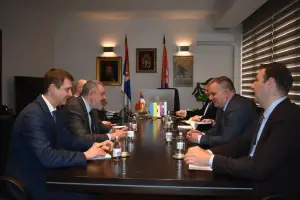 Belgrade, 11 February 2026
Belgrade, 11 February 2026Ample space for advancing cooperation with Ukraine in field of education
-
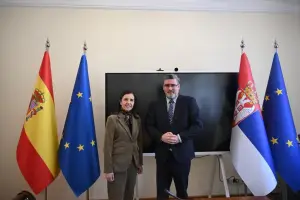 Belgrade, 11 February 2026
Belgrade, 11 February 2026Spain’s support for Serbia’s European path
-
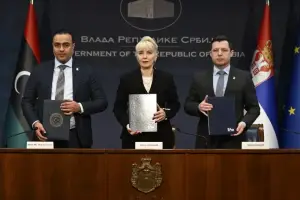 Belgrade, 10 February 2026
Belgrade, 10 February 2026Libya’s participation in Expo 2027 confirms strong bilateral relations
-
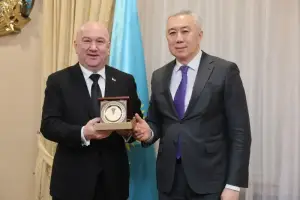 Belgrade/Astana, 10 February 2026
Belgrade/Astana, 10 February 2026Potential for advancing cooperation with Kazakhstan in multiple sectors
-
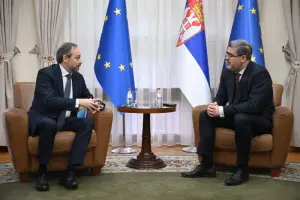 Belgrade, 10 February 2026
Belgrade, 10 February 2026Serbia fully committed to implementation of reforms
-
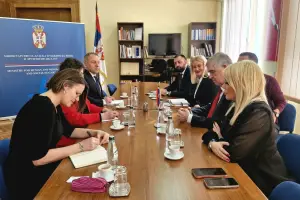 Belgrade, 9 February 2026
Belgrade, 9 February 2026Partnership with Romania in solving issues of importance to citizens
-
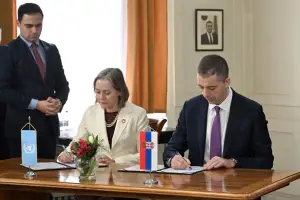 Belgrade, 9 February 2026
Belgrade, 9 February 2026UN-Republic of Serbia Sustainable Development Cooperation Framework 2026-2030 signed
-
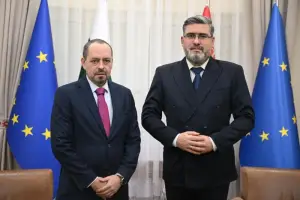 Belgrade, 9 February 2026
Belgrade, 9 February 2026Support of neighbouring countries of great importance for Serbia’s European integration process
-
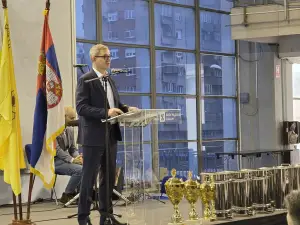 Belgrade, 7 February 2026
Belgrade, 7 February 2026Solid foundations for long-term, systemic development of beekeeping laid
-
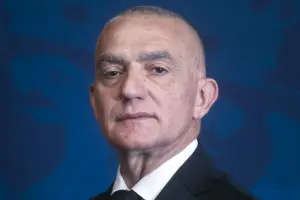 Belgrade/Brussels, 6 February 2026
Belgrade/Brussels, 6 February 2026Serbia's full readiness to cooperate with EC to accelerate reform implementation
